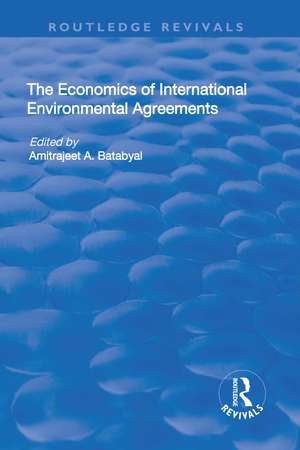The Economics of International Environmental Agreements: Routledge Revivals
Editat de Amitrajeet Batabyalen Limba Engleză Hardback – 2 noi 2017
Din seria Routledge Revivals
- 9%
 Preț: 767.40 lei
Preț: 767.40 lei - 9%
 Preț: 1004.17 lei
Preț: 1004.17 lei - 9%
 Preț: 934.94 lei
Preț: 934.94 lei -
 Preț: 230.80 lei
Preț: 230.80 lei -
 Preț: 294.72 lei
Preț: 294.72 lei -
 Preț: 258.66 lei
Preț: 258.66 lei - 9%
 Preț: 903.41 lei
Preț: 903.41 lei - 18%
 Preț: 695.85 lei
Preț: 695.85 lei -
 Preț: 296.10 lei
Preț: 296.10 lei -
 Preț: 342.36 lei
Preț: 342.36 lei - 9%
 Preț: 606.35 lei
Preț: 606.35 lei -
 Preț: 309.94 lei
Preț: 309.94 lei - 9%
 Preț: 729.99 lei
Preț: 729.99 lei -
 Preț: 256.94 lei
Preț: 256.94 lei -
 Preț: 230.80 lei
Preț: 230.80 lei -
 Preț: 259.47 lei
Preț: 259.47 lei - 9%
 Preț: 903.80 lei
Preț: 903.80 lei -
 Preț: 153.81 lei
Preț: 153.81 lei -
 Preț: 258.66 lei
Preț: 258.66 lei -
 Preț: 294.91 lei
Preț: 294.91 lei -
 Preț: 200.66 lei
Preț: 200.66 lei -
 Preț: 199.85 lei
Preț: 199.85 lei -
 Preț: 308.89 lei
Preț: 308.89 lei -
 Preț: 295.04 lei
Preț: 295.04 lei -
 Preț: 382.23 lei
Preț: 382.23 lei -
 Preț: 258.66 lei
Preț: 258.66 lei -
 Preț: 343.21 lei
Preț: 343.21 lei - 9%
 Preț: 640.90 lei
Preț: 640.90 lei - 9%
 Preț: 605.71 lei
Preț: 605.71 lei -
 Preț: 228.88 lei
Preț: 228.88 lei -
 Preț: 257.67 lei
Preț: 257.67 lei -
 Preț: 245.10 lei
Preț: 245.10 lei -
 Preț: 258.52 lei
Preț: 258.52 lei -
 Preț: 258.66 lei
Preț: 258.66 lei -
 Preț: 368.93 lei
Preț: 368.93 lei -
 Preț: 246.37 lei
Preț: 246.37 lei - 9%
 Preț: 764.34 lei
Preț: 764.34 lei -
 Preț: 258.66 lei
Preț: 258.66 lei -
 Preț: 326.26 lei
Preț: 326.26 lei -
 Preț: 286.98 lei
Preț: 286.98 lei - 8%
 Preț: 418.23 lei
Preț: 418.23 lei - 5%
 Preț: 231.22 lei
Preț: 231.22 lei -
 Preț: 267.15 lei
Preț: 267.15 lei -
 Preț: 295.62 lei
Preț: 295.62 lei - 9%
 Preț: 638.61 lei
Preț: 638.61 lei -
 Preț: 260.85 lei
Preț: 260.85 lei -
 Preț: 339.90 lei
Preț: 339.90 lei -
 Preț: 381.17 lei
Preț: 381.17 lei -
 Preț: 294.53 lei
Preț: 294.53 lei -
 Preț: 294.72 lei
Preț: 294.72 lei
Preț: 460.87 lei
Preț vechi: 592.65 lei
-22% Nou
Puncte Express: 691
Preț estimativ în valută:
88.20€ • 91.56$ • 73.54£
88.20€ • 91.56$ • 73.54£
Carte tipărită la comandă
Livrare economică 22 martie-05 aprilie
Preluare comenzi: 021 569.72.76
Specificații
ISBN-13: 9781138705227
ISBN-10: 1138705225
Pagini: 282
Dimensiuni: 167 x 243 mm
Greutate: 0.68 kg
Ediția:1
Editura: Taylor & Francis
Colecția Routledge
Seria Routledge Revivals
Locul publicării:Oxford, United Kingdom
ISBN-10: 1138705225
Pagini: 282
Dimensiuni: 167 x 243 mm
Greutate: 0.68 kg
Ediția:1
Editura: Taylor & Francis
Colecția Routledge
Seria Routledge Revivals
Locul publicării:Oxford, United Kingdom
Cuprins
Acknowledgements, Series Preface, Introduction, PART I. INTERNATIONAL ENVIRONMENTAL AGREEMENTS: THEORY, 1. ‘The Problem of Global Environmental Protection’, Oxford Review of Economic Policy, 6, pp. 68-79, 2. ‘Global Environmental Problems: The Effects of Unilateral Actions Taken by One Country’, Journal of Environmental Economics and Management, 20, pp. 55-70, 3. ‘Creating a Good Atmosphere: Minimum Participation for Tackling the “Greenhouse Effect” ’, Economica, 60, pp. 281-93, 4. ‘Strategies for the International Protection of the Environment’, Journal o f Public Economics, 52, pp. 309-28, 5. ‘Self-Enforcing International Environmental Agreements’, Oxford Economic Papers, 46, pp. 878-94, 6. ‘Environmental Consciousness and Moral Hazard in International Agreements to Protect the Environment’, Journal of Public Economics, 60, pp. 95-110, 7. ‘Negotiating an Agreement on Global Warming: A Theoretical Analysis’, Journal of Environmental Economics and Management, 32, pp. 170-88, 8. ‘The Effects of Collusion and Limited Liability on the Design of International Environmental Agreements for Developing Countries’, Aldershot: Ashgate Publishing Limited, pp. 1-25, PART II. INTERNATIONAL ENVIRONMENTAL AGREEMENTS: APPLICATIONS, 9. ‘Political Institutions and Pollution Control’, Review of Economics and Statistics, 74, pp. 412-21, 10. ‘Efficiency and Distribution in Greenhouse Negotiations’, Kyklos, 46, pp. 363-97, 11. ‘A Finnish-Soviet Acid Rain Game: Noncooperative Equilibria, Cost Efficiency, and Sulfur Agreements’, Journal of Environmental Economics and Management, 24, pp. 87-99, 12. ‘Voluntary Provision of a Public Good: Results from a Real World Experiment’, Kyklos, 47, pp. 505-18, 13. ‘The Voluntary Provision of a Pure Public Good: The Case of Reduced CFC Emissions and the Montreal Protocol’, Journal of Public Economics, 63, pp. 331-49, 14.‘A Tale of Two Collectives: Sulphur versus Nitrogen Oxides Emission Reduction in Europe’, Economica, 64, pp. 281-301, Name Index
Descriere
This title was first published in 2000: Conflicts between developed and developing countries over global environmental problems, and the fact that the co-operation required to solve environmental collective action problems is typically elusive in the world of international relations, suggests a research agenda regarding how one might hop to bring about co-operation in an inherently non-co-operative international setting.
